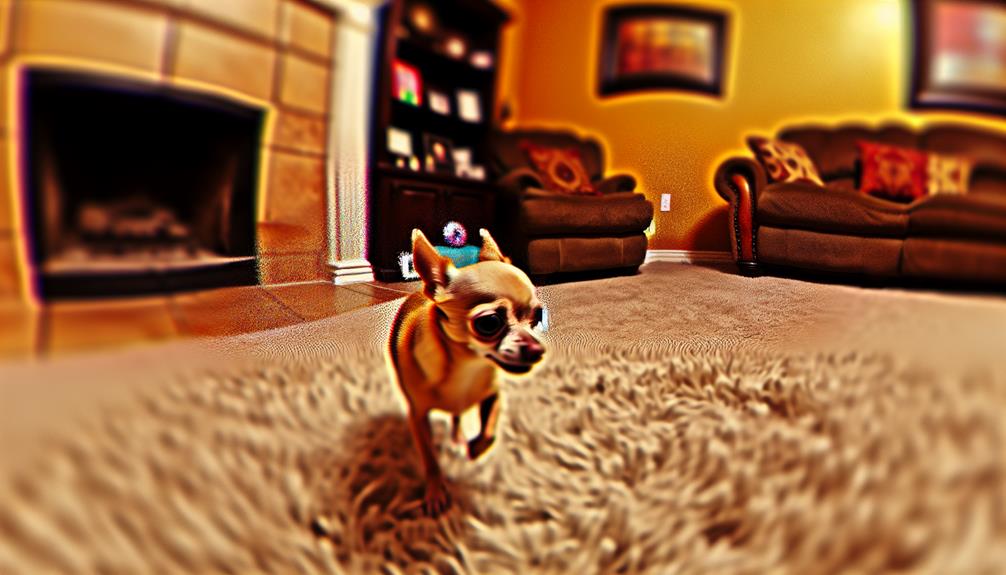
18 Apr Why Chihuahuas Shake: Unveiled!
If you've ever wondered why Chihuahuas shake, the answer may surprise you. These pint-sized pups have a fascinating physiology that plays a significant role in their trembling behavior. From their delicate frame to their keen sensitivity, there's more to their shivers than meets the eye. Discover the intricate reasons behind this endearing yet puzzling trait and gain insights that could deepen your bond with your Chihuahua companion. Stay tuned for a revealing journey into the world of Chihuahua behavior and uncover the secrets behind their adorable shakes.
Physiology and Shaking Behavior
Chihuahuas, with their high metabolism and low body fat, shake as a natural response to feeling cold and other stimuli due to their unique physiology. This shaking behavior isn't just about being cold; it's a complex interplay of their physiology, stress, anxiety, and survival mechanisms. Their tiny bodies are finely tuned instruments that react swiftly to changes in their environment. When they shiver, it's their body's way of generating heat to combat the cold, showcasing their remarkable adaptation to survive.
The physiology of Chihuahuas is a marvel to behold. Their high metabolism keeps them constantly on the move, burning energy at a rapid pace. Combine this with their low body fat, and you have a breed that struggles to retain warmth in chilly conditions. Stress and anxiety also play a role in triggering their shaking behavior, revealing how interconnected their physical and emotional well-being truly is. Understanding their physiology is key to providing them with the care and comfort they need to thrive.
Environmental Influences on Shaking
You know that your Chihuahua's shaking might be influenced by the environment they're in. Temperature fluctuations can make them tremble, especially in cold weather.
Understanding how factors like cold drafts or wet fur affect your pup is crucial for keeping them comfortable.
Temperature and Shaking
When addressing the issue of shaking in Chihuahuas, one crucial factor to consider is the impact of temperature on their propensity to shiver. Chihuahuas, with their small size and low body fat, are more sensitive to cold temperatures, causing them to shiver to regulate their body heat.
In chilly environments, their thin coats offer little protection, making them prone to shaking. To help reduce shivering caused by the cold, providing blankets or clothing can assist in maintaining their body temperature.
Be mindful of cold weather triggers like drafts or low indoor temperatures, as these can worsen shaking episodes in Chihuahuas. By monitoring and managing the temperature in their environment, you can play a vital role in minimizing the shaking related to cold sensitivity in your beloved Chihuahua.
Anxiety and Shaking
Feeling anxious or stressed, your Chihuahua may exhibit shaking as a response to environmental triggers such as new people or changes in routine. Understanding that anxiety, stress, fear, and discomfort can lead to shaking in Chihuahuas is crucial. Factors like separation anxiety and unfamiliar environments can intensify these feelings. By recognizing and addressing these anxiety triggers, you can help alleviate your Chihuahua's shaking episodes. Providing a safe space and offering reassurance during times of stress are essential in managing their anxiety. Remember, your Chihuahua relies on you to create a secure and comforting environment. Below is a table summarizing the role of environmental factors in triggering anxiety-related shaking in Chihuahuas:
| Environmental Factors | Impact on Chihuahuas | Examples |
|---|---|---|
| New People | Increase anxiety levels | Visitors, strangers |
| Changes in Routine | Disrupt sense of security | New schedule, environment |
| Social Interactions | Heighten stress and fear | Dog parks, crowded places |
Health Factors and Shaking Behavior
If your Chihuahua is shaking, it could be a sign of underlying health issues like kidney disease or pain. Factors such as genetics and metabolism can also play a role in their shaking behavior.
It's essential to monitor these patterns closely to catch any potential health problems early.
Possible Medical Conditions
Shaking behavior in Chihuahuas serves as a crucial indicator of potential underlying medical conditions, emphasizing the importance of vigilant health monitoring and prompt veterinary intervention.
Various health issues like kidney disease, pancreatitis, and Generalized Tremor Syndrome (GTS) could be behind your Chihuahua's shaking. Factors such as genetics, metabolism, anxiety, stress, low blood sugar, changes in temperature, and environmental triggers can also contribute to this behavior.
As Chihuahua owners, it's vital to stay alert to any unusual shaking episodes and consult with a veterinarian when necessary. Remember, early detection and proper medical care are key in managing and treating any medical conditions that may be causing your Chihuahua to shake.
Your furry friend's well-being is our top priority!
Behavioral Triggers
When considering the behavioral triggers that can lead to shaking behavior in Chihuahuas, it's crucial to understand the intricate interplay between health factors and their impact on your furry companion's well-being. Chihuahuas, being small dogs, are particularly prone to issues such as hypoglycemia, which can manifest as shaking.
Additionally, anxiety, stress, and fear are common behavioral triggers that can contribute to your Chihuahua displaying shaking behavior. These emotions can be overwhelming for your pet, and understanding how they affect your Chihuahua is key to providing proper care.
Recognizing these triggers and their effects can help you manage and minimize shaking episodes, ensuring your Chihuahua's health and happiness. Regular veterinary care and monitoring are essential to address any underlying health issues promptly.
Stress and Anxiety Triggers
During times of stress and anxiety, Chihuahuas may exhibit shaking as a response to various triggers. Factors such as loud noises, unfamiliar environments, or separation from owners can lead to heightened anxiety in these small pups. Common stressors for Chihuahuas include changes in routine, encounters with new people or pets, and situations that make them feel vulnerable or threatened. Additionally, anxiety triggers like thunderstorms, fireworks, or visits to the vet can also contribute to shaking episodes in Chihuahuas.
To help alleviate stress and reduce shaking episodes, it's important to understand your Chihuahua's fears and provide a safe and comforting environment. Effective management of stress and anxiety through positive reinforcement training and calming techniques can significantly improve your Chihuahua's overall well-being. By addressing these triggers and creating a supportive atmosphere for your furry companion, you can help them feel more secure and at ease in their surroundings.
Behavioral Causes of Shaking
To understand why Chihuahuas shake due to behavioral triggers, consider the factors that can influence their responses to various stimuli. Chihuahuas may shake in response to a range of emotions such as excitement, fear, anxiety, and stress. When faced with new people, social interactions, or overwhelming situations, shaking can be a common behavioral response. High-energy Chihuahuas might also shake to release excess energy accumulated from moments of heightened excitement or anticipation. Providing a calm and safe environment is crucial in minimizing shaking episodes triggered by behavioral factors. Understanding and addressing the root causes of anxiety, fear, and stress are essential steps in managing shaking behavior in Chihuahuas.
- Imagine the relief of your Chihuahua in a serene and safe space.
- Picture the joy your furry friend feels when excess energy is released through play.
- Consider the comfort your Chihuahua finds in moments of fear and anxiety.
- Visualize the trust your pet places in you to navigate overwhelming situations.
- Envision the bond strengthened through understanding and addressing your Chihuahua's shaking triggers.
Age and Shaking Patterns
Age-related patterns significantly influence the shaking behaviors observed in Chihuahua puppies and older individuals. Chihuahua puppies may shake more frequently as they develop their nervous systems and adapt to new environments. The unfamiliarity and excitement of new surroundings can lead to increased shaking episodes in these young pups.
On the other hand, older Chihuahuas may experience shaking due to age-related health issues such as arthritis or cognitive decline. Understanding these age-related shaking patterns is crucial in tailoring appropriate care and management strategies.
As Chihuahuas age, they may exhibit behavioral changes and adaptations that contribute to their shaking episodes. By recognizing the unique needs of Chihuahua puppies and older individuals, you can provide the necessary support and comfort to help them navigate through these challenges with compassion and expertise.
Owner Influence on Shaking
Owners wield a powerful influence over their Chihuahuas' behavior, shaping their responses to stress and anxiety triggers. When it comes to addressing shaking in Chihuahuas, your role as an owner is crucial. Here are five essential ways you can positively impact your Chihuahua's shaking behavior:
- Create a Calm Environment: Establishing a peaceful and secure environment can help alleviate your Chihuahua's stress and reduce shaking episodes.
- Provide Consistent Training: Training your Chihuahua to cope with stressors can build their confidence and decrease anxiety-related shaking.
- Recognize Behavioral Cues: Understanding your Chihuahua's body language and behaviors can aid in identifying stress and anxiety triggers early on.
- Offer Comfort and Reassurance: Your Chihuahua looks up to you for comfort; providing reassurance during stressful situations can help prevent shaking.
- Prioritize Proactive Care: Regular veterinary check-ups, proper nutrition, and engaging activities are vital for maintaining your Chihuahua's overall well-being and minimizing shaking due to stress or anxiety.
Nutritional and Grooming Impact
When it comes to caring for your Chihuahua's well-being, understanding the impact of nutrition and grooming practices is key in promoting a healthy and happy pet.
Proper grooming routines like regular brushing and nail trimming can help alleviate stress and anxiety in Chihuahuas, potentially reducing shaking episodes. Additionally, a balanced and high-quality diet tailored to your Chihuahua's specific nutritional needs plays a crucial role in supporting overall health.
By providing comfortable bedding and cozy resting areas, you can help your Chihuahua feel secure and relaxed, ultimately contributing to a decrease in shaking episodes. Dental care is also essential; regular teeth brushing and dental check-ups can prevent discomfort or pain that may lead to shaking behavior.
Furthermore, incorporating omega-3 fatty acids into your Chihuahua's diet can promote healthy skin and coat, potentially reducing skin-related issues that could contribute to shaking. Prioritizing your Chihuahua's nutrition and grooming not only enhances their physical health but also boosts their overall comfort and well-being.








No Comments